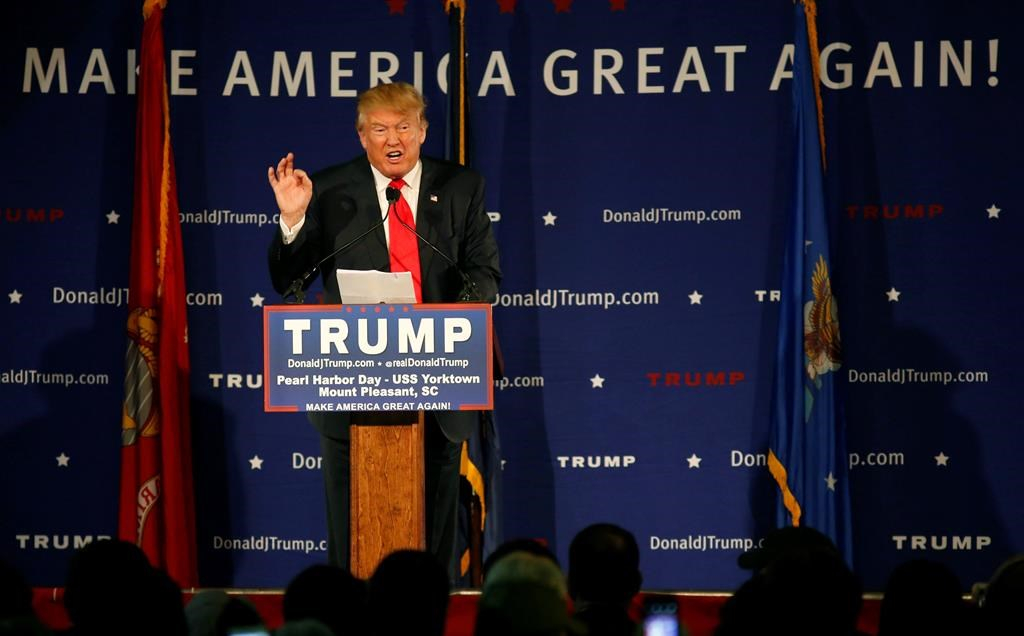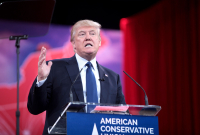Support strong Canadian climate journalism for 2025
WASHINGTON — Donald Trump's eye-popping proposal to ban Muslim travel to the United States prompted an unprecedented level of condemnation for a campaign frequently derided as a buffoonish electoral sideshow.
This time his critics weren't calling him a clown — but something worse.
The idea of religion-based controls at the border prompted the leadership of his party to denounce him Tuesday. Media who'd previously laughed at him likened him to a fascist.
World leaders took the unusual step of commenting on a foreign, internal partisan process.
Without mentioning Trump by name, Prime Minister Justin Trudeau and his ministers noted that Canadians had rejected Muslim-bashing politics in the recent election. Britain's David Cameron called Trump's idea unhelpful and wrong, and NDP Leader Tom Mulcair floated his own idea: a Trump travel ban.
"We should make sure that Donald Trump stays out of Canada," Mulcair told reporters.
Trump responded defiantly to the uproar.
He even blasted out a tweet that many viewed as a thinly veiled threat against his Republican party brass. He posted a new poll that suggested more than two-thirds of his supporters would follow him, should he run as an independent.
This was after prominent members of his party condemned him.
The Republicans' top figure in Congress, Paul Ryan, said he'd break his no-interference rule to castigate comments he called antithetical to American values and to conservative principles.
The White House, however, demanded deeper repudiation.
A spokesman for President Barack Obama insisted that Republicans pledge to oppose Trump should he become the nominee — a significant step no other candidate has taken.
"What Donald Trump said yesterday disqualifies him from serving as president," said Obama spokesman Josh Earnest. "And any Republican who's too fearful of the Republican base to admit it has no business serving as president either...
"It's morally reprehensible. It runs counter to the Constitution. And it has consequences for our national security."
The tone of U.S. media coverage also appears to have shifted.
It was illustrated on the front page of the Philadelphia Daily News: "The New Furor," was its lead headline under an unflatteringly timed photo of Trump with an extended arm.
An interviewer on MSNBC told him: "There's a number of Americans you're really scaring right now, including me."
Another interviewer on CNN put it more bluntly: "Leaders from your own party (are) saying this is un-American and extreme and that it makes you a fascist. How do you respond?"
This was the day after Trump read out a statement on his new policy to a partisan crowd. He received cheers throughout a caustic speech where he railed against the media in the back of the room as "absolute scum."
The Huffington Post announced its own policy change. Trump was no longer to be treated as a joke. The website had covered Trump in its entertainment section since the summer.
Now the primaries are less than two months away. Trump remains in first place in the Republican polls. And he's supplemented his promise to deport 11 million mostly Hispanic illegal migrants with a policy aimed at Muslims.
It would be the United States' first culture-based entry ban in approximately seven decades, since the repeal of Asian-exclusion laws. The comic relief is over, the site founder declared.
"(Trump's campaign has) morphed into something else: an ugly and dangerous force in American politics," Arianna Huffington wrote in a post. "So we will no longer be covering his campaign in Entertainment...The 'can you believe he said that?' novelty has curdled and congealed into something repellent and threatening."
Like an inflatable punching bag, though, Trump has repeatedly bounced back from controversy and defied the disdain of opinion elites. He brushed off the concerns of interviewers Tuesday.
When pressed about how his plan would work — American passports do not have a religious affiliation stamped on them — Trump explained that border guards would ask a question.
"They would say, 'Are you Muslim?'" Trump told MSNBC.
If travellers answer yes, he said, they'd be banned.
Fellow Republicans denounced him with varying degrees of acerbity. Jeb Bush called him unhinged, Sen. Lindsey Graham called him a race-baiting, xenophobic bigot, but some presidential candidates higher up in the polls, like Sen. Ted Cruz, distanced themselves more cautiously.
None have said they'd oppose him, should he win their party's nomination.
In a public letter, Hillary Clinton accused the entire Republican party of being similar to Trump — but only marginally less extreme in its anti-Muslim rhetoric.
The Democratic front-runner quoted George Washington on religious liberty and shared an anecdote about two Muslim women being berated in a Texas coffee shop, and leaving in tears because no other customers defended them.
"This is your country, too," she wrote.
"I'm proud to be your fellow American."
Alexander Panetta, The Canadian Press



Comments